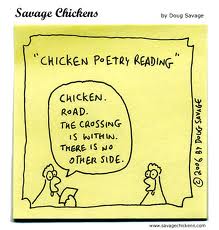C.D. Wright: “Poetry is language that sounds better and means more.” [This is first in a series in which I take some quotes I’ve collected over time and try to figure out why I saved them.] What is meant by “sounds better” has been exhaustively examined by every Introduction to Poetry book ever written, plus a passel of poets like C.D. Wright. Here is the beginning of one of Wright’s poems, “Why Ralph Refuses to Dance”:He would have to put out his smoke.At this time of year the snakes are slow and sorry-actingHis ice would melt. He’d lose his seat.you don’t take chances once in a while you still seeHe does not feel the beat.a coontail tied to an aerial but don’t lookHis pocket could be picked. His trousers rip. There are two points of view in this poem. The uncapitalized sentences are from Ralph, the others from someone else. “Sounds better” may mean that we are knocked slightly akilter, that the language doesn’t trot along as expected, so our ears are more interested. I would use that myself for a definition of “sounds better.” Now if I were taking the time here to write an essay rather than a blog entry, I’d talk about all the other poets—Coleridge, Keats, Rich, and basically every poet who’s ever written about poetry—and how they weigh in on this topic, which is a non-topic in the sense that sound and sense are not two, but one, and not one, but two, and can be talked about like a Zen koan. So being knocked akilter will be my catch-all phrase for being somehow being stricken by language instead of being completely sucked into the train ride toward meaning. Then the other piece of the quotation is “means more.” If you think about that, it's perfectly silly. Language can only mean what it means. Words have definitions. But of course words can allude, suggest, insinuate into multiple realms. They mean more when they mean two things at once. They mean more when they mysteriously open gaps in our linear path that point to something there are no words for. Then there’s the elephant in the room. “Better?” “More?” than what? Is poetry “more” than prose? You can line up your “Poets are the unacknowledged legislators of mankind” guns, now. “Poetry is truth in its Sunday clothes,” says Joseph Roux. I’ve gotten myself into the position, now, of having to deal with the avalanche of self-aggrandizement. C.D. Wright’s words sum up the entire history of truisms about poetry. Which makes me want to look at that again, askance.  What I think is that “Poetry” (say the word with a slightly British accent and the nose a bit upturned), meaning the best of it, not the worst, elevates itself. This is what I think. It decides that it gets to legislate; it decides that it points to the truth that it by-God-has-seen. The truth “Gleams like the flashing of a shield—the earth / and common face of Nature spake to me,” says Wordsworthin “The Prelude.” Poetry takes its own authority: we, the readers/critics, don’t bestow it.FINE. The difference between “good” and “bad” poetry is that we believe the good poetry. We see that it is true, that the speaker has somehow taken upon herself a palpable truth. The more we read poems, the more we see the difference between the Truth and truthiness. It’s not a matter of sheer chutzpah. There are a million poems that think they have the “best words in the best order,” as Coleridge put it, pretty much sewn up. It seems to me to be some delicate balance of insight and fear. As in “I see, I must speak because I see, and I realize that speaking carries with it this weight of responsibility to speak it right: to make the words do their best.” We can feel all those things in the best poems: weight, fear, insight.
What I think is that “Poetry” (say the word with a slightly British accent and the nose a bit upturned), meaning the best of it, not the worst, elevates itself. This is what I think. It decides that it gets to legislate; it decides that it points to the truth that it by-God-has-seen. The truth “Gleams like the flashing of a shield—the earth / and common face of Nature spake to me,” says Wordsworthin “The Prelude.” Poetry takes its own authority: we, the readers/critics, don’t bestow it.FINE. The difference between “good” and “bad” poetry is that we believe the good poetry. We see that it is true, that the speaker has somehow taken upon herself a palpable truth. The more we read poems, the more we see the difference between the Truth and truthiness. It’s not a matter of sheer chutzpah. There are a million poems that think they have the “best words in the best order,” as Coleridge put it, pretty much sewn up. It seems to me to be some delicate balance of insight and fear. As in “I see, I must speak because I see, and I realize that speaking carries with it this weight of responsibility to speak it right: to make the words do their best.” We can feel all those things in the best poems: weight, fear, insight.
Quotes I've Saved and Why--#1
in Archive
